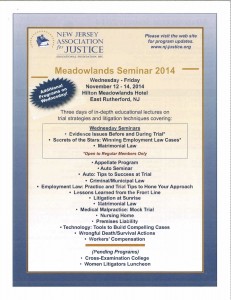
Workers’ Compensation and Third Party Prospective
Christopher DiGirolamo to speak at Meadowlands Seminar November 14, 2014
Case law is constantly developing and changing, and the recent Dever v. New Jersey Manufacturers Insurance Company case raises a number of questions, rather than answers.
The Dever case deals with a number of issues, including workers’ compensation, Section 40 liens, third-party lawsuits, and what is commonly known as “double recovery.” Double recovery is when someone files multiple claims on a single accident or event with multiple insurers. For example, an injured worker may file a workers’ compensation claim and also a personal injury claim against a third party to recover damages after a work-related accident, but the worker is not allowed to recover the same damages from both sources.
A Section 40 lien is designed to prevent double recovery in the state of New Jersey. For example, say a workers’ compensation carrier pays out $50,000 in medical benefits and temporary disability benefits to an injured worker. The worker then brings a suit against the third party responsible for the accident and recovers $250,000. The Section 40 lien would then come into play, and the workers’ compensation carrier would be entitled to (2/3 statutory) reimbursement of the $50,000 it originally paid out. This way, the injured worker benefits from the third-party suit, while not “profiting” from the accident by receiving payments from two different sources.
Next, it is helpful to understand the background in Dever v. New Jersey Manufacturers Insurance. Mr. Dever sustained severe injuries in a car accident while on the job, and the other driver had a policy limit of $25,000. Dever received medical benefits from his workers’ compensation carrier, settled his third-party claim with the other driver for the full policy limits, and then filed a claim under his Underinsured Motorist Policy.
During trial, the jury awarded Dever only $275,000 in damages after finding he did not prove a permanent injury. During appeal, the uninsured motorist insurance carrier argued that it should be reimbursed for the medical expenses Dever recovered in court because of the double recovery concept.
In past cases, New Jersey courts have treated underinsured motorist (UIM) payments just like recovery from a third party. Therefore, the Section 40 lien applies and the workers’ compensation carrier is entitled to reimbursement for the benefits it paid to the worker.
However, the court decided differently in Dever. The court made two key decisions in this case:
- When an employee is injured in a work-related car accident, workers’ compensation is the primary avenue for recovering medical expenses
- A workers’ compensation carrier has no right to Section 40 payment of medical benefits from the UIM carrier
Essentially, the court decided that a Section 40 lien against damages in a third-party case cannot include medical expenses awarded through New Jersey’s workers’ compensation program. The court held that allowing the employer to recover a Section 40 reimbursement from a UIM carrier contradicts the legislative intent of the workers’ compensation scheme, and therefore should not be allowed because the medical bills technically could have been submitted and paid by Mr. Dever’s personal automobile No Fault insurance carrier.
This ruling is particularly confusing when you consider established court law on double recovery and workers’ compensation. At the end of the day, the ruling limits the subrogation rights of the workers’ compensation carrier–at least for now.
It is important to note that Dever is an unpublished case, so it is not legally binding. The case is considered “persuasive,” meaning each judge or court can make an individual decision about the reasoning of the case and whether or not it is persuasive in another context.
Christopher DiGirolamo will speak on this topic at the New Jersey Association for Justice Educational Foundation’s Meadowlands Seminar, scheduled for November 12-14, 2014, at the Hilton Meadowlands Hotel in East Rutherford, NJ. Mr. DiGirolamo’s presentation will take place on the morning of Friday, November 14.















